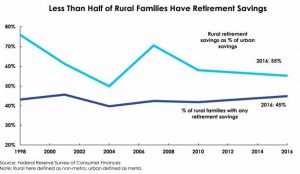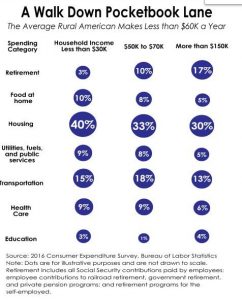Rural areas still have less employment than they did before the recession. To make up the difference requires “smart” programs that build on rural assets.
A Democratic plan to address the economic growth in rural America says the nation needs smart public investments in clean energy development, construction, advanced manufacturing and outdoor recreation.
The policy recommendations released Wednesday by Democratic members of the Congressional Joint Economic Committee also called for improving rural health care, education, housing, agriculture and other sectors that are not receiving adequate attention currently, they said.
The report showcases “many bright spots” and “assets to build on,” said U.S. Senator Martin Heinrich (D-New Mexico), the ranking member of the Joint Economic Committee. “Many rural communities are leading the way as more of the country moves more of its energy production into renewables, particularly with wind development,” he said. “Outdoor recreation opportunities are not just at the center of life with rural communities but also drive very important economic opportunities and growth.”
Promoting growth in clean energy jobs requires investment, the report says. “To take full advantage of this opportunity requires new infrastructure investments that will enable the efficient transmission of energy from rural areas to other parts of the country,” the report says.

Jobs in wind and solar energy increased 32% and 25% respectively in 2016, while overall employment grew by only 1.6%. Approximately 3.4 million Americans work in the clean economy sector, the report said.
In 2016, landowners received about $245 million in land lease payments from wind developments. Schools and local governments can also earn property and use tax revenues on wind-power installations.
One example is the Sagamore Wind Project, a new wind farm in rural New Mexico.
“The project will ultimately invest $865 million and generate power for nearly 200,000 homes,” the report says. “In addition to creating hundreds of jobs and lowering energy costs for consumers, the project will generate $43 million in state tax revenue and $82 million in funding for local schools.”
Outdoor recreation is another growth area, the report says. The industry generated $374 billion in spending in 2016, up nearly 4% from the previous year. More than 4 million Americans work in the outdoor recreation industry. Rural areas, especially those located near public lands, parks and national monuments, are major players in this industry, according to the report.
Rural counties with significant outdoor recreation activities on public lands are reversing rural decline. “Between 2000 and the Great Recession, rural counties with higher levels of recreation activity saw faster population growth than other rural counties, suggesting that outdoor recreation may play a key role in attracting new residents to rural areas,” the report says. “Total employment in recreation-intense rural counties has recovered more than in other rural counties.”
Senator Heinrich said that the benefits of outdoor recreation on public lands in rural New Mexico are clear. “We have seen that when you have public lands that have special designations, things like National Monuments, that those draw additional visitors, that you have business development and job creation that happens around those spaces,” he said. “And that you end up seeing an increased tax base at the local level.”
He said rural communities are stepping up to protect public lands in the face of Trump administration rollbacks, which have included reductions at New Mexico’s Organ Mountain Desert Peaks and Rio Grande Del Norte National Monuments. “We’ve seen the communities really rally around those special places, particularly because of some of the threats from the Trump administration and their efforts to undo some of these Antiquities Act designations,” Heinrich said. “We’ve really seen these communities, the businesses within these communities, rally around these places to protect what they’ve been able to gain in recent years.”
Heinrich said that the farm bill now moving through the House and Senate should help address the economic and infrastructure of existing farmers, as well assisting young and beginning farmers to enter the business.
The founder of an organization that is trying to help New Mexican enterprises tap more federal funding said rural investments were good for the nation. “We all gain when we invest in things like wind and solar energy, in outdoor recreation and agricultural innovation,” said Terry Brunner, founder of Grow New Mexico.
“We know from experience that when Washington supports rural America, they succeed and entire nation reaps the benefits. Really those economic opportunities only can advance if you lay the groundwork around housing, infrastructure, education, health care and shore up these communities so that they can be as productive as possible.”
The report’s core recommendations are to invest in emerging economic sectors like renewable energy and outdoor recreation while shoring up existing agriculture, health and other federal programs. Specific recommendations include the following:
- Family finances: help rural residents save more for retirement, provide federally guaranteed paid-family-leave benefits, improve tax incentives to benefit low and moderate income families (such as the Earned Income Tax Credit).
- Education: increase early childhood education opportunities, improve public and tribal school funding, expand college guidance and training, improve teacher training and professional development.
- Infrastructure: expand broadband access, invest in rural water and sewage systems, create an Infrastructure Financing Authority for rural communities, improve rural transportation systems.
- Public lands: resist public land privatization, pass Bipartisan Sportsmen’s Act to improve access to recreation on federal public land, integrate clean energy projects on public lands, engage local communities on public land management decisions.
- Housing: boost non-profit groups’ capacity to gain access to federal capital, invest in improving Indian Country housing, improve mortgage access through community banks, create incentives for local businesses to invest in housing stock.
- Health care: protect and expand Medicaid, strengthen and improve Medicare in rural communities, increase rural health care workforce, improve health care technology like broadband and electronic medical records, lower prescription drug prices and cost of care.
- Agriculture: pass a bipartisan farm bill, reform tax policies to benefit small and midsized farms, improve beginning farmer access to capital and land, provide certainty to farmers for trade policy, boost housing programs for farmworkers.
This article was originally published by Daily Yonder.



